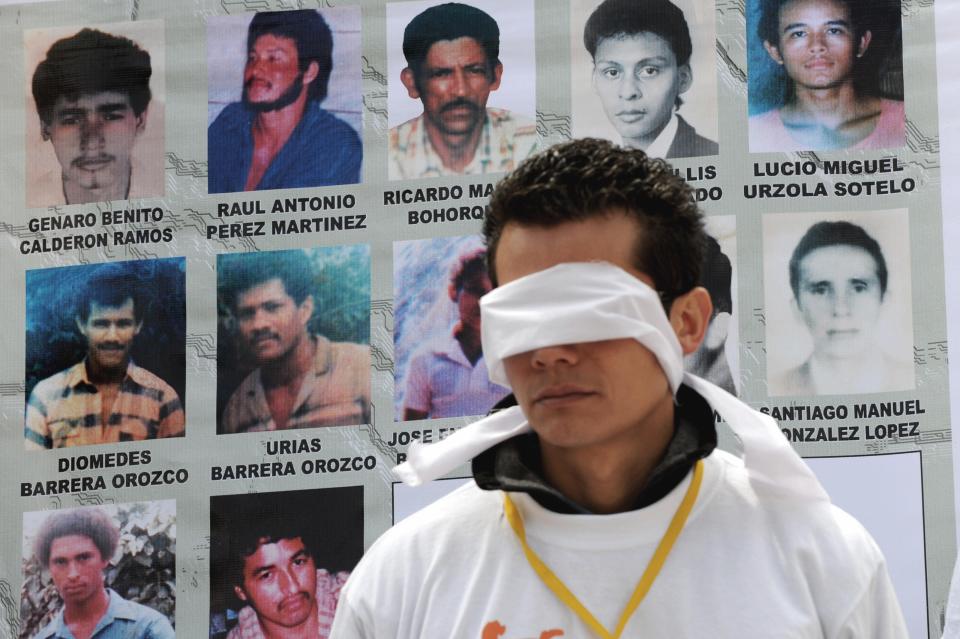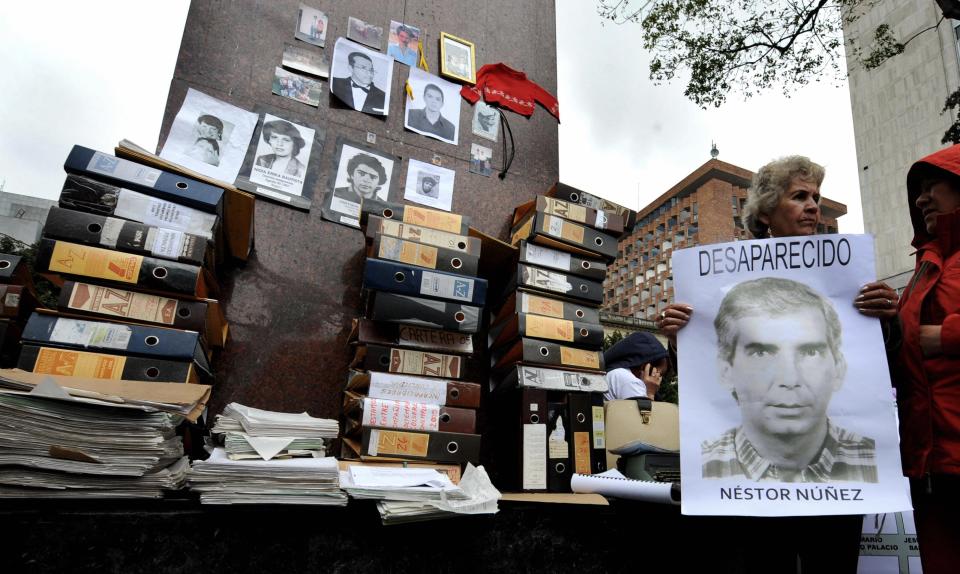Appeals court reinstates lawsuits accusing Chiquita of helping terrorists kill Colombians
- Oops!Something went wrong.Please try again later.
Like thousands of Colombians, Jose Lopez’s seven children have spent more than a decade fighting to hold Chiquita Brands International responsible for financially backing a terrorist organization that ravaged the country during its murderous decade-long reign.
But even though one of the leaders of the group apologized to the grieving family for kidnapping and fatally shooting their father, and a Colombian court agreed he was responsible for Lopez’s death, a federal judge ruled that wasn’t enough to drag the banana giant into court.
That changed this month when an appeals court, in a stunning reversal, reinstated claims that Chiquita and some of its chief executives violated Colombian law and the U.S. Anti-Torture Act by funneling $1.7 million to the Autodefensas Unidas de Colombia (AUC), which the U.S. government designated as a foreign terrorist organization.
The decision by the 11th Circuit Court of Appeals paves the way for thousands of victims of the bloody rule of the AUC, a right-wing paramilitary group, to get their day in court, said West Palm Beach attorneys James Green and Jack Scarola.
“Chiquita is facing by any reasonable measure billions of dollars in damages,” Scarola said.
Cincinnati attorney Michael Cioffi, who represents the company that has offices near Fort Lauderdale and in North Carolina and Switzerland, declined comment. Company officials couldn’t be reached.
Epstein trial: Dave Aronberg: Post's suit to unseal Jeffrey Epstein documents meant only to humiliate me
Glenn Straub case: Glenn Straub's lawyers ask appeals court to release Dave Aronberg's ex-wife's deposition
Trump vs. Clinton: Judge throws out Donald Trump racketeering suit vs. Hillary Clinton ... and rips it to shreds

'Funding a terrorist organization can never be treated as a cost of doing business'
More than 7,500 people who lost loved ones during the AUC’s gruesome campaign have filed suit against Chiquita. The suits from around the country were consolidated and are being considered by U.S. District Judge Kenneth Marra in West Palm Beach.
The suits were filed more than a decade ago after Chiquita in 2007 pleaded guilty to a felony charge of doing business with a terrorist organization, admitting it paid the AUC $1.7 million from 1997 to 2004 to protect its banana-growing operations in the war-torn country. It agreed to pay a $25 million fine, the largest ever imposed under global terrorism sanctions regulations.
"Funding a terrorist organization can never be treated as a cost of doing business," Jeffrey Taylor, U.S. Attorney for the District of Columbia, said then in announcing the plea deal. "American businesses must take note that payments to terrorists are of a whole different category. They are crimes.”
Since then, the complex litigation has consumed attorneys on two continents with U.S. attorneys, including Green, traveling to Colombia to interview those who were victimized by the death squads and members of the group who were convicted in Colombia for their roles in the bloodshed.
To prove their claims against Chiquita, the victims must first prove that AUC was responsible for the deaths.
Noting the complexity of the case, the three appeals court judges applauded Marra’s ability to sift through thousands of documents. As to his rulings, “we conclude that (Marra) got some right and some wrong.”
For instance, it said, Marra wrongly ruled that Lopez’s children couldn’t testify that AUC commander Rendón Herrera confessed to their father’s murder because the family's attorneys hadn’t deposed him. The appeals court pointed out that the attorneys twice arranged to interview Herrera in Colombia and he failed to appear.
“These two failed depositions show that the plaintiffs employed reasonable means of attempting to procure Mr. Rendón Herrera’s testimony,” the appeals court judges ruled. Therefore, they said, the Lopez children could tell a jury that he confessed to killing their father.
Like many former AUC leaders, Herrera was prosecuted in Colombia. As part of what is known as the Justice and Peace process, those suspected of tens of thousands of murders were encouraged to confess in exchange for lenient sentences. Prosecutors were required to verify the confessions and those who lied faced perjury charges
While Marra refused to allow documents from the Colombia process to be used to back up claims of AUC’s involvement in the deaths, the appeals court said some could be used to prove the narco-terrorist group was responsible.

AUC targeted, tortured political enemies, banana workers, unionists, analyst says
Further, the appeals judges said, academic and legal experts could testify about the prosecutions and explain the terror the AUC wreaked.
Oliver Kaplan, a University of Denver professor who has spent decades visiting Colombia and studying the country's bloody decades-long civil war, will be allowed to tell a jury that the murders described by family members have all the markings of those perpetuated by AUC members.
They were known to target political enemies, banana workers and unionists, he said in a deposition quoted by the appeals court. Riding high-cylinder motorcycles and white or gray cars, they tormented the rural banana-growing region by grabbing people off buses and torturing and decapitating victims.
Some of the murders were public executions. In many cases, people simply disappeared.
The appeals court ruling affects about a dozen so-called bellwether cases. They were selected from the scores that have been filed to give both sides an idea of their chances of success. The goal is to spur settlement talks.
Both Scarola and Green said it is unclear whether the cases will be settled out of court.
In 2018, Chiquita settled a lawsuit with the families of five Central Florida missionaries and an Alabama geologist who were killed by a left-wing rebel group that terrorized Colombians in the 1990s. Chiquita admitted paying $220,000 to the Revolutionary Armed Forces of Colombia, commonly known by its Spanish acronym FARC. It claimed responsibility for the murders.
So far, Chiquita has defended the AUC cases vigorously in hopes the victims and their lawyers give up, Scarola said.
“It may take a few trials for them to realize they aren’t going to escape paying reasonable compensation for the devastation they financed,” Scarola said.
Even if Chiquita wins a few of the cases, dozens more will be waiting in the wings, he said. “It’s not a class action case where you win or lose and that’s it. This is a mass tort. The cases keep coming.”
Jane Musgrave covers federal and civil courts and occasionally ventures into criminal trials in state court. Contact her at jmusgrave@pbpost.com.
This article originally appeared on Palm Beach Post: Chiquita can face suits over support of Colombian terrorists, court rules

